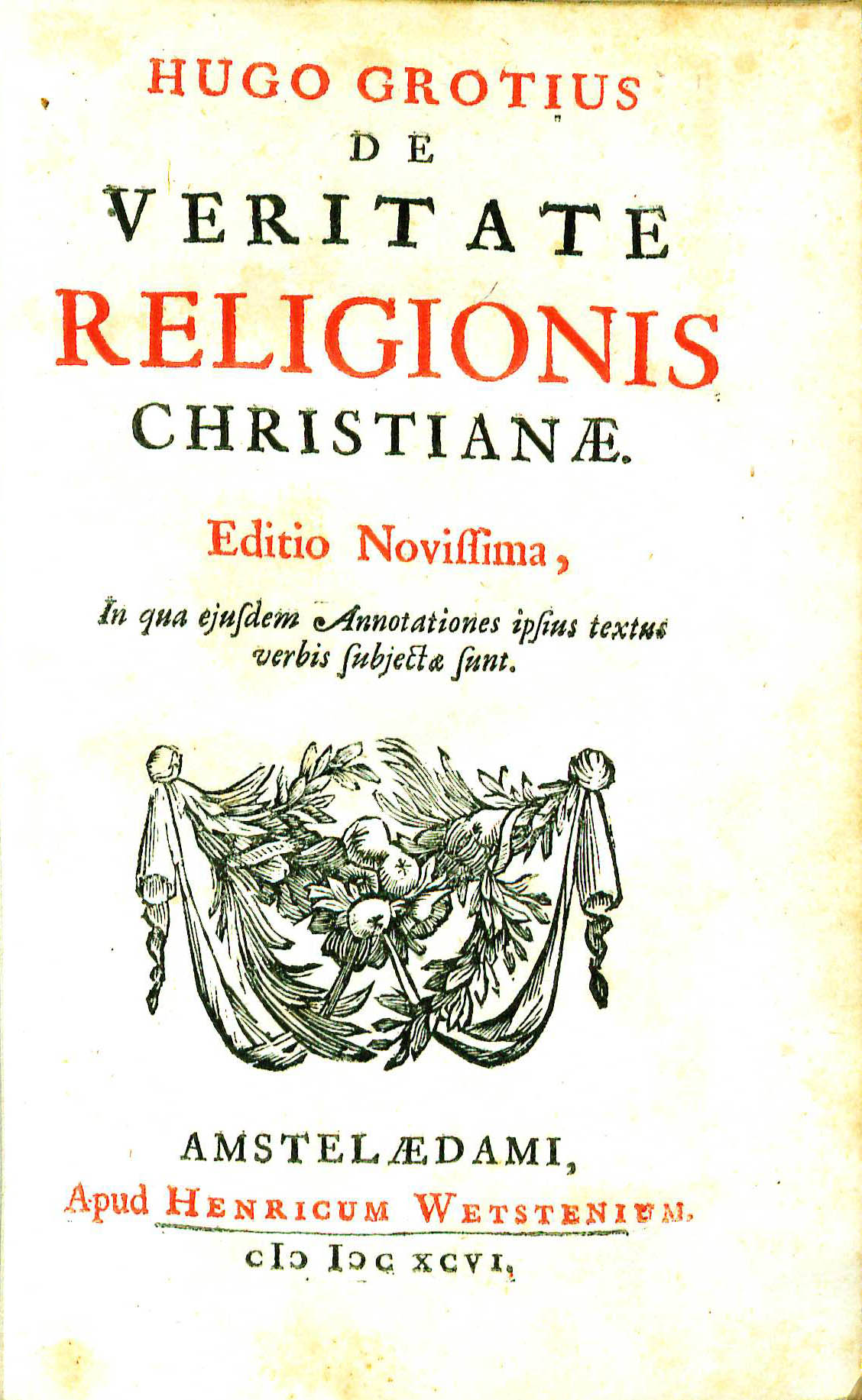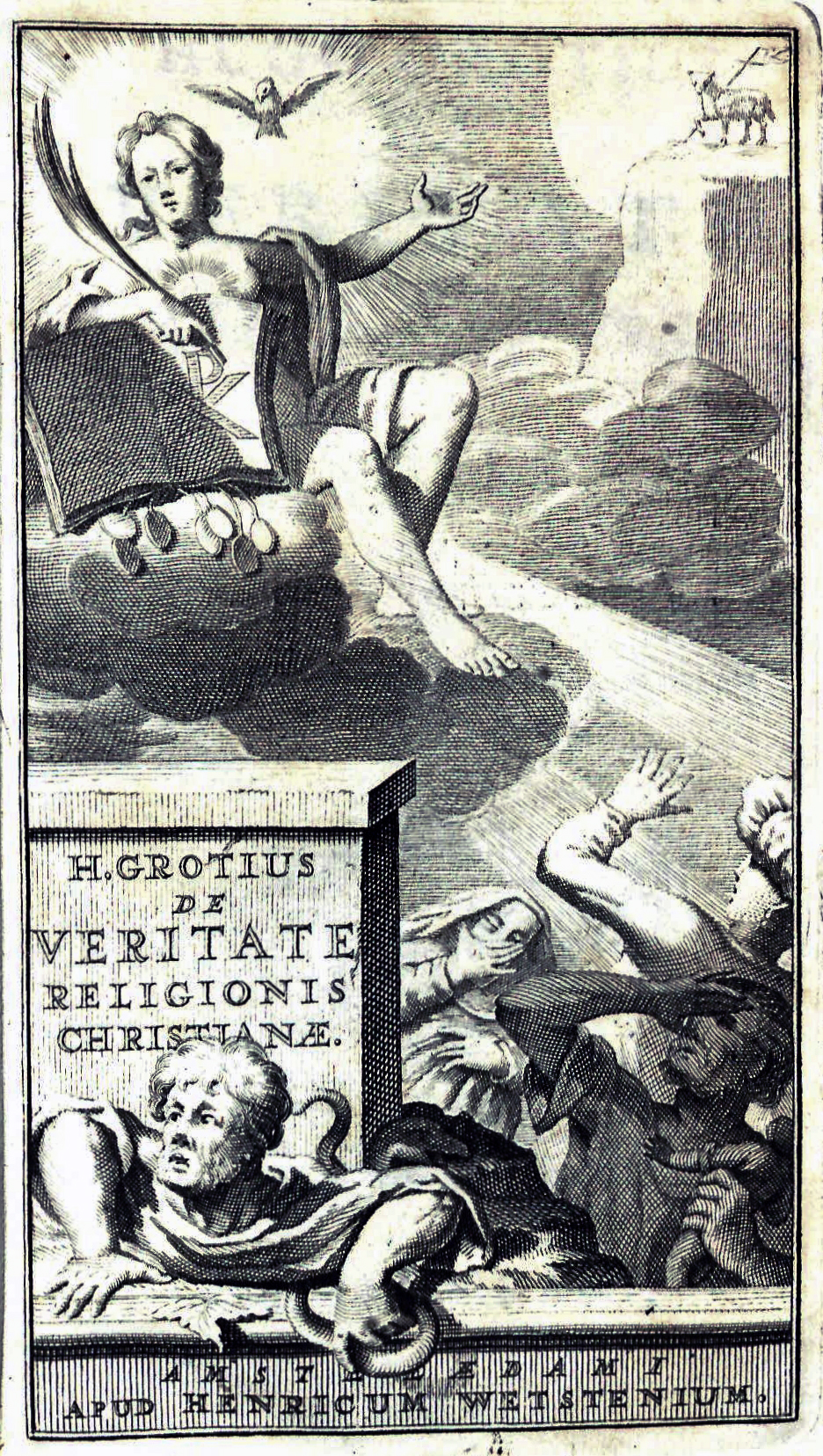Difference between revisions of "De Veritate Religionis Christianae"
| Line 15: | Line 15: | ||
|desc=8vo (16 cm.) | |desc=8vo (16 cm.) | ||
}}[[File:GrotiusDeVeritate1696Illustration.jpg|left|thumb|250px|<center>Half-title.</center>]] | }}[[File:GrotiusDeVeritate1696Illustration.jpg|left|thumb|250px|<center>Half-title.</center>]] | ||
| − | Hugo Grotius was a Dutch poet. He composed this work in a prison cell in 1620 after being arrested by Prince Mauris on 29 August 1618. It was first published in 1622.<ref>Jeremiah Hackett, reviewer, | + | Hugo Grotius was a Dutch poet. He composed this work in a prison cell in 1620 after being arrested by Prince Mauris on 29 August 1618. It was first published in 1622.<ref>Jeremiah Hackett, reviewer, “''Hugo Grotius as Apologist for the Christian Religion: A Study of His Work "De Veritate religionis christianae (1640)'' by J. P. Heering; J. C. Grayson,” ''The Sixteenth Century Journal'' 38, no. 1 (Spring 2007): 164.</ref><br/> |
| − | <br/>This poem, | + | <br/>This poem, ''De Veritate Religionis Christianae'', is a Latin version of the Dutch poem “Bewijs van den waren godsdienst.”<ref>Ibid.</ref> It means “Proof of True Religion” and was written in 1622 as a defense of Christianity against other religions and atheism.<ref>Ibid.</ref> He proposed an undogmatic Christianity – bringing him into conflict with Dutch Calvinists who practice confession. He “was an ecumenist ''avant la lettre'',”<ref>Ibid.</ref> meaning he was an advocate of a single Church before there was a general movement toward that goal.<ref>[http://en.wikipedia.org/wiki/Ecumenism “Ecumenism”]</ref> The work contains six “books” with the first three touting the merits of Christianity, and the last three attacking paganism, Judaism, and Islam, respectively.<ref>Hackett, 164.</ref> As an ecumenist and apologetic,<ref>[http://en.wikipedia.org/wiki/Apologetic “Apologetic”]</ref> he identifies the cause of “the disunity and warmongering among Christian nations” as the “multiplicity of doctrines and the authority given to them.”<ref>Hackett, 164.</ref> |
==Evidence for Inclusion in Wythe's Library== | ==Evidence for Inclusion in Wythe's Library== | ||
Revision as of 14:21, 27 March 2014
by Hugo Grotius
| De Veritate Religionis Christianae | |
|
Title page from De Veritate Religionis Christianae, George Wythe Collection, Wolf Law Library, College of William & Mary. | |
| Author | Hugo Grotius |
| Published | Amstelaedami: Apud Henricum Wetstenium |
| Date | 1696 |
| Edition | Editio novissima |
| Language | Latin |
| Pages | [8], 296 |
| Desc. | 8vo (16 cm.) |
Hugo Grotius was a Dutch poet. He composed this work in a prison cell in 1620 after being arrested by Prince Mauris on 29 August 1618. It was first published in 1622.[1]
This poem, De Veritate Religionis Christianae, is a Latin version of the Dutch poem “Bewijs van den waren godsdienst.”[2] It means “Proof of True Religion” and was written in 1622 as a defense of Christianity against other religions and atheism.[3] He proposed an undogmatic Christianity – bringing him into conflict with Dutch Calvinists who practice confession. He “was an ecumenist avant la lettre,”[4] meaning he was an advocate of a single Church before there was a general movement toward that goal.[5] The work contains six “books” with the first three touting the merits of Christianity, and the last three attacking paganism, Judaism, and Islam, respectively.[6] As an ecumenist and apologetic,[7] he identifies the cause of “the disunity and warmongering among Christian nations” as the “multiplicity of doctrines and the authority given to them.”[8]
Evidence for Inclusion in Wythe's Library
Listed in the Jefferson Inventory of Wythe's Library as Grotius de veritate religionis Christianae. 8vo. and given by Thomas Jefferson to his son-in-law, Thomas Mann Randolph. Later appears on Randolph's 1832 estate inventory as "'Grotius on Christ: Religion (latin)' ($1.50 value)." We do not have enough information to conclusively identify which edition Wythe owned. George Wythe's Library[9] on LibraryThing indicates this without naming a specific edition. The Brown Bibliography[10] lists the 1745 duodecimo edition published in Glasgow. Jefferson listed the volume as an octavo, but we do not know the precise edition owned by Wythe. The Wolf Law Library purchased a copy of the 1696 octavo edition published in Amsterdam.
Description of the Wolf Law Library's copy
Bound in contemporary vellum with manuscript title and "626" or "bzb" on spine. Purchased from Daniel Thierstein.
View this book in William & Mary's online catalog.
References
- ↑ Jeremiah Hackett, reviewer, “Hugo Grotius as Apologist for the Christian Religion: A Study of His Work "De Veritate religionis christianae (1640) by J. P. Heering; J. C. Grayson,” The Sixteenth Century Journal 38, no. 1 (Spring 2007): 164.
- ↑ Ibid.
- ↑ Ibid.
- ↑ Ibid.
- ↑ “Ecumenism”
- ↑ Hackett, 164.
- ↑ “Apologetic”
- ↑ Hackett, 164.
- ↑ LibraryThing, s. v. "Member: George Wythe," accessed on November 13, 2013, http://www.librarything.com/profile/GeorgeWythe
- ↑ Bennie Brown, "The Library of George Wythe of Williamsburg and Richmond," (unpublished manuscript, May, 2012) Microsoft Word file. Earlier edition available at: https://digitalarchive.wm.edu/handle/10288/13433

